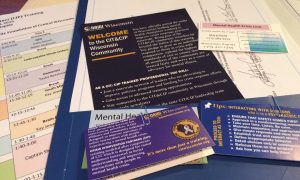A co-worker gets devastating news at work. His daughter has been killed in a car crash. He’s in shock. He says he wants to trade places with her.

On a hot summer day, you notice an elderly man wandering in the parking lot before you go into the grocery store. He’s still there when you exit 45 minutes later.
What do you do?
Those were scenarios we considered at the end of a two-day Crisis Intervention Partner, or CIP, training. It was organized by NAMI Portage-Wood Counties and featured speakers on a variety of topics including: the impact of trauma, mental health conditions, veterans and PTSD, excited delirium, virtual hallucinations, suicide prevention, dementia, youth concerns, brain-based disorders and de-escalation techniques.
It was thorough and well organized. A grant from the Community Foundation of Central Wisconsin meant it was free for participants.
It was fascinating to learn more about mood and personality disorders. It was distressing to hear voices during the virtual hallucination and know that for some people, the voices don’t stop when you take off the headphones. It was good to learn de-escalation techniques and see them in practice. It was helpful to learn whom to call and where to turn when someone is in crisis.
We don’t often have people who have meltdowns in assisted living – but it has happened. We deal with behaviors every day from dementia, and while most don’t rise to the level of crisis, it’s still good to have a solid footing for what to do and what not to do.
It also can help in your everyday life. It’s likely we all will face tragedy at some point. We each deal with stress, disappointment and hurt in different ways. Being able to recall our training and know that we have resources to turn to can help us reach out to family members, friends, co-workers or even that stranger in the parking lot who looks lost.

Very interesting, I am sure. I can speak to the hallucinations from experience last June! Glad there are such training exercises for those of you in the positions you are in, although I can see where it would benefit almost everyone sometime in their life.
Thank you for reading. The training showed us lots of different ways in which people can be in crisis. Everyone’s personal experiences play into their understanding, but we all can learn how to approach someone in crisis and when to call for help.